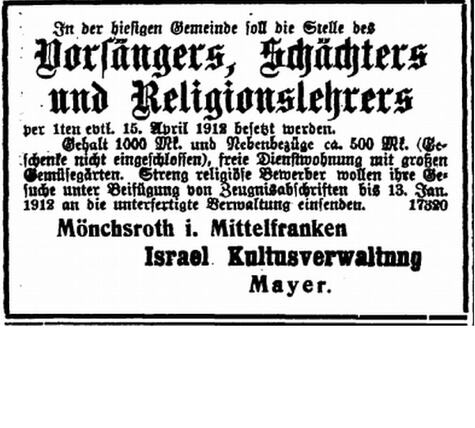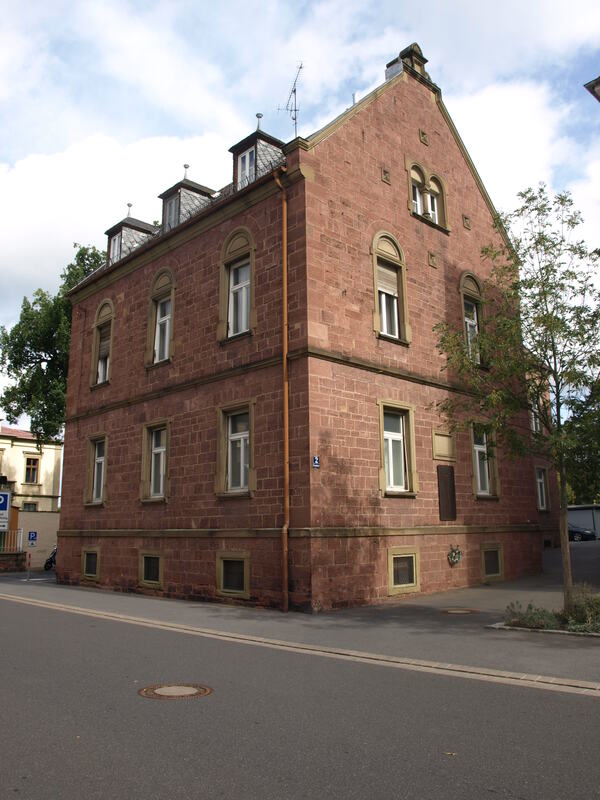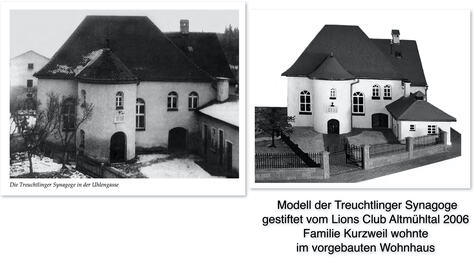personal data
Kurzweil Moses
Parents:Adolf Kurzweil and Netty née Kundstadt
Siblings: Geschwister: Sussmann, Malka Amalia m. Donath, Abraham Ayre, Samuel, Charlotte, Ignaz, Michael, Johanna
Spouse: Lina née Finke
Children: Walter, Isidor (Izchak), Adolf (Amram), Theo
Maxstraße 10 (today Promenadestraße)
September 1942 deported from Frankfort/Main to Terezin
biography
Moses (Moritz) Kurzweil lived in Bad Kissingen for only a few years and was employed by the local Jewish community as cantor and shochet.
He was born on April 19, 1875, as the son of the religious official Adolf Kurzweil and his wife Netty, née Kundstadt, in Bratislava (Pressburg)/Slovakia, which at that time belonged to the Habsburg Dual Monarchy. He had risen to the rank of officer in the Imperial and Royal Army and had already moved to Germany before the First World War. Before 1912 he lived in Fellheim near Memmingen. From 1912 he lived in Mönchsroth in the central Franconian district of Ansbach and was active there as a religious teacher, cantor and shochet.

In April 1914, he married Lina Finke, born in Theilheim in the district of Schweinfurt (today a part of Waigolshausen), with whom he had four children: Walter (*1915), Isidor (*1918), Adolf (*1920) and Theo (*1926).
The family initially lived in Mönchsroth and moved to Bad Kissingen in March 1921, where Moses Kurzweil found employment as cantor and shochet of the Jewish community. He lived with his family in the Jewish Community House (today Promenadestraße 2).
|
|
As son Isidor recalls, the children received "a certain military, albeit strictly religious education," which can certainly be explained by the father's professional career.
In August 1924, the Kurzweil family left the Franconian spa town again, for Moses Kurzweil took up a position as cantor and shochet in Treuchtlingen in the district of Weißenburg-Gunzenhausen, which he held until 1932/33. The family lived there in the Uhlengasse in the front building of the synagogue, which was called the "Judenschule" and was traditionally the home of the community's cantor.

|
|
Moses Kurzweil's relationship with his employer, the Jewish Community of Treuchtlingen, was not very harmonious. There were repeated complaints and grievances against the cantor and shepherd, as can be seen from Kurzweil's personnel file. Apparently, his way of organizing services and also the performance of his duties as shochet were not well received everywhere. In a letter of October 1925, the Kultusverwaltung reproached him, "You conduct the service on feast days in a manner to which the congregation is not accustomed. In particular, on the basis of the contract concluded with you, you want to practice the chants as is customary here. Also, the service on the other days is to be criticized... It should not go unmentioned that the service on Simchas Torah has caused general dissatisfaction." (Personnel file for Cantor [Chasan] and Shechard [Shochet] Moses Kurzweil 1875-1943).![]() And there was also criticism from the butchers and community members about the shochet's meat collection.
And there was also criticism from the butchers and community members about the shochet's meat collection.
His relatively early departure from office at the age of 58 and his early retirement were obviously not without dispute with the Jewish Cultural Administration. After the termination of the contract was also under discussion there, Moses Kurzweil applied for retirement as of April 1933 "on the basis of his state of health and an official medical certificate", which also met with the approval of the Jewish Cultural Administration. At least Moses Kurzweil and his family could continue to live for rent in the previous service apartment in the front building of the synagogue.
The neighbours of Uhlengasse, on the other hand, obviously had very positive memories of the family: "There was a good relationship with the Kurzweils, who lived in the neighbouring synagogue. Cantor Moses Kurzweil was a person of respect for all the children in Uhlengasse. His wife Lina, who was a trained nurse, helped without distinction of religion when she was called" (Walter E. Keller, Jüdisches Leben in Treuchtlingen).
However, after the National Socialists came to power, the Jewish minority in the town suffered increasingly from growing anti-Semitism, which erupted in brutal form especially during the November pogrom of 1938:
The riots in Treuchtlingen began in the early morning hours of November 10. Members of the Treuchtlingen SA set fire to the synagogue as well as the home of cantor Moses Kurzweil. One witness recalled how the men in front of the house of Cantor Moses Kurzweil shouted, "Jud' open up, get out, we'll set your house on fire, otherwise we'll burn you!" (Michael Wildt ,...p.71....) The synagogue with the entire inventory, the Torah scrolls, the rituals as well as the residential building in front burned down to the foundation walls. More and more Treuchtlingen citizens also marched with the SA thugs to the Jewish homes and took part in the violent actions. Men, women and youths cheered on the thugs, looted the stores and destroyed apartments. Some of the Jewish residents were injured in the attacks and now fled the small town. On their way to the train station, they were taunted and beaten by the surrounding crowd. Of the 93 Jews still living in Treuchtlingen, all but three had left the town by November 11, 1938.
Moses Kurzweil, his wife Lina and their youngest son Theo, who was born in Fürth in 1926, also had to flee Treuchtlingen. They moved to Frankfort/Main and lived there in Frankfort's Nordend at Fichtestraße 5. The three older sons Walter, Isidor (Izchack) and Adolf (Amram) managed to escape to Palestine in time. They thus survived the Nazi era.
Moses and Lina Kurzweil, on the other hand, became victims of the Shoa. In September 1942, both were deported from Frankfurt to Theresienstadt. Lina died there a year later, and Moses survived his wife by only a few weeks. The date of his death is given as October 11, 1943.
Their youngest son Theo (*1926), who lived in Berlin and in the "Landwerk Steckelsdorf" in Brandenburg before his deportation, was also deported from there to Auschwitz as a 16-year-old together with 51 other mostly young people in July 1942 and murdered. In the "Landwerk Steckelsdorf," a "Hachshara camp" that was supposed to prepare young people for emigration to Palestine, presumably he still had hopes of emigrating to Palestine like his older brothers - hopes that were not to be fulfilled.
Moses Kurzweil's younger brother Michael, who had also emigrated from Bratislava to Germany and worked for decades as a cult official in the Jewish community in Frankfurt, also became a victim of the Shoa. He emigrated to the Slovakian town of Topolcany at the beginning of World War II, but was deported from there to Auschwitz with his wife and murdered.
References
Meldedaten Stadtarchiv Bad Kissingen
Bad Kissingen Adressbücher 1922 und 1924
Auszug aus: Walter E. Keller, Jüdisches Leben in Treuchtlingen, 2008![]()
Walter E. Keller, Jüdisches Leben in Treuchtlingen, Online-Version![]()
Aus der Geschichte der jüdischen Gemeinden im deutschen Sprachraum, Treuchtlingen/Altmühl (Mittelfranken/Bayern)![]()
"Wir sind gute Freunde geworden", Artikel im "Treuchtlinger Kurier", 15.06.2010![]()
Michael Wildt, Gewalt gegen Juden in Deutschland 1933 bis 1939 in: Werkstatt Geschichte 18, Hamburg 1997, insbesondere S. 71![]()
Michael Wildt, Antisemitische Gewalt und Novemberpogrom in: Die „Reichskristallnacht“ in Schleswig-Holstein. Der Novemberpogrom im historischen Kontext. Herausgegeben von Rainer Hering (Veröffentlichungen des Landesarchivs Schleswig-Holstein Band 109). Hamburg 2016, S.224ff![]()
Gedenkbuch Bundesarchiv Koblenz, Einträge Kuzweil Moses![]() , Lina
, Lina![]() , Theo
, Theo![]()
Deportationsliste, Landwerk Steckelsdorf, Juli 1942 in: Statistik des Holocaust![]()
Israel's archives are going online![]()
Memoirs of Isi Kurzweil, born in Treuchtlingen, Germany, regarding his experiences as a British Army soldier from Mandatory Palestine who was taken captive during the war, Yad Vashem Documents Archive, Record Group: O.33 - Testimonies, Diaries and Memoirs Collection, File Number: 7401![]()
Datenbank Genicom, Moses Kurzweil![]()
Informationen Alexander Hilbig,Gemeinde Waigolshausen, Eheurkunde Moses Kurzweil und Lina Finke, Mail 30.06.2021
Informationen G. Reese, Mönchsroth, Mail vom 02.08.2021 (Anstellungsvertrag mit der Israelitischen Kultusgemeinde Mönchsroth, 1912, Staatsarchiv Nürnberg)
Personalakte für Kantor [Chasan] und Schächter [Schochet] Moses Kurzweil (1875-1943), Israelitische Gemeindearchive in Bayern, Gemeinde Treuchtlingen, CAHJP, Gemeinde Treuchtlingen D-Tr 1/5![]() ,
,
Protokollbuch Israelit. Kultusverwaltung,Sitzungsniederschriften der Israelitischen Kultusgemeinde Treuchtlingen.,CAHJP, Gemeinde Treuchtlingen D-Tr 1/3 ![]()
Photo credits
Werbeanzeige © Alemannia Judaica Mönchsroth
Jüdisches Gemeindehaus Bad Kissingen © Stadtarchiv Bad Kissingen
Fotos Synagoge Treuchtlingen © Walter E. Keller![]()
Back